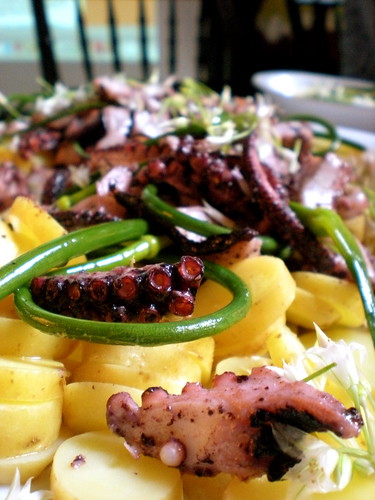
This last Monday night, Foodista collaborated with Michael Hebb of Onepot.org and Foraged and Found Edibles in the Caffe Vita Loft for a "Friends of Foodista" dinner. What came together in the kitchen was beyond extraordinary. If you have followed Michael Hebb lately, you'll notice that the guy is involved in a variety of projects all over Seattle and making the rules up as he goes. As part of the evening's experiment, I showed up to the Vita loft around 11:30 am and set up my laptop at the edge of the kitchen counter right next to Chef Conor Donahue from San Francisco who was busy slicing butter clams, and began to document recipes directly into Foodista as each recipe was created in front of me.
The dinner wasn't completely thrown together by the seat-of-their-pants over the weekend. Chef and co-founder of Foraged and Found Edibles, Christina Choi, and Chef Donahue met with Hebb and decided on a menu inspired by seasonal and foraged ingredients from the area. The menu would be about the ingredients. Every recipe on Monday night's menu was either foraged wild or locally harvested. Even the butter clams for the Butter Clam Fritter Appetizer was foraged by Foodista co-founders Barnaby and Sheri over a long weekend near Hope Island.

Chef Choi showed up at the loft carrying ingredients freshly picked only 24- 48 hours prior and set to work baking off Elderberry Shortbread to go with the local strawberries with elderberry syrup that we would later eat for dessert. As I was attempting to write precise recipes into the Foodista site, I received less than standard responses to measurements, techniques and even ingredients for most of the recipes. Not to anyone's fault, it's just that chefs don't often use measurements while they are cooking, chefs cook by feel, taste, touch and smell. So when I ask for the recipe on how to make their specific court bouillon, they're recipe suggestion was to "use what you have lying around," only half joking of course. For example, while Hebb was preparing the octopus, I asked, "Okay, so what is the next step?" "
“Use a sharp knife and cut head from tentacles," he said
“And then what do you with the head?"
“Say... give it to your cat."
"Michael, can you tell me what is in the spice rub for the elk shoulder and what the amounts were?"
His response was, “Open your pantry, use a variety of spices that appeal to you. We used juniper berries, fennel seeds, chili flakes, cumin and coriander guajillo chili peppers."
Over the course of the day and into the evening I watched the three experienced chefs create stunning dishes out of simple, but high quality ingredients and all inside a fairly basic kitchen set up. The dishes were beautiful, delicious and made with respect to the ingredients. I kept thinking as each gorgeous dish was passed around the table, I’ve seen these ingredients before, I can do this at home- with the right recipe that is. When you buy fresh and local, the ingredients speak for themselves and don’t require too much work on your part. Plus, you are supporting local farmers and foragers who didn’t fly your produce from half way around the world to get it to you. If you need a little inspiration for turning your farmer market seabeans or garlic scapes into a great meal, check out the recipes created by Onepot on Foodista.

MENU
Appetizers
Butter clam fritters with wild sorrel aioli:
Lemon balm leaves with raw porcini salad and chive flowers:
Plates
Local scallop crudo with sea beans and shiso:
Octopus with fingerlings and wild onion blossoms:
Elk shoulder with porcini, farro, and garlic scapes:
Wood violet and miners lettuce salad:
Sweet
Local strawberries with elderflower syrup and cream:
Farm direct Caffe Vita Sumatra Gayo River coffee


















Comments
May 26, 2010
[...] and no longer live in Northern California, I miss the Baylands. So, imagine my surprise while at a very cool dinner last year, I found pickle weed on my plate. Only it was called “sea beans,” and [...]
May 26, 2010
Thanks Vegtastic-
Yes, I am a big fan of sea beans! I like the name pickle weed, that's great. I also know those salty succulents as Marsh Samphire, Salicornia, Glasswort, Sea Pickle or Samphire.